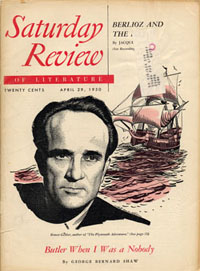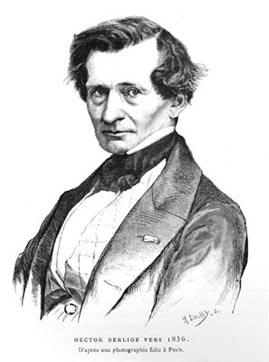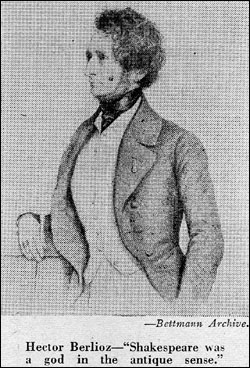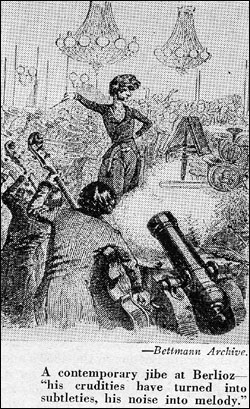
![]()
By
Jacques Barzun
© Jacques Barzun
Published in

 |
By Jacques Barzun © Jacques Barzun Published in |
 |
“To be past forty and not know ‘Hamlet’ is like having spent one’s life in a coal-mine!” Thus wrote Berlioz in the 1860’s about some friends at whose house he was going to read the play aloud—they knew none of it but the name. When we think of the nineteenth century as one of Shakespeare idolatry we forget what limits of place, provincialism, and educated ignorance confine even a world reputation. It was not merely the French of that day who neglected the poet; Berlioz tells us also that his Irish friend Balfe, the composer of "The Bohemian Girl," had just "discovered" Shakespeare in the Fifties. And the performances, comments, and interpretations then current often seemed to Berlioz in the last degree discouraging about the fate of art.
His own discovery dated back to 1827, when the first English actors to win success in Paris had brought to the young Romantics "Hamlet" and "Romeo," together with "Jane Shore" and "The Rivals." From that moment, Berlioz was not only an admirer and an evangelist, but in a very real sense a disciple. Shakespearean form and something that may be called the Shakespearean temperament were to be integral elements of Berlioz’s art.
 When the revelation came, it was of course
combined with the living charm of the beautiful Ophelia, Harriet Smithson, who
in time would become Madame
Berlioz, but even at the earliest date it was the spell of Shakespeare that kept
Berlioz infatuated with a woman he had never met, and not the woman who endowed
Shakespeare with power over Berlioz’s mind. After seeing a couple of
performances the young composer begins at once to learn English and to qualify
as one of the most thorough readers and users of Shakespeare that the world has
ever seen. For his work then in progress—"Eight Scenes from Goethe’s
‘Faust’ "—he chooses a number of Shakespearean mottoes, and
thenceforth we can trace the poet’s words in all that Berlioz wrote and
composed, down to "Beatrice and Benedict," adapted by himself from
"Much Ado," and the last page of the "Memoirs," which ends
with "Life’s But a Walking Shadow."
When the revelation came, it was of course
combined with the living charm of the beautiful Ophelia, Harriet Smithson, who
in time would become Madame
Berlioz, but even at the earliest date it was the spell of Shakespeare that kept
Berlioz infatuated with a woman he had never met, and not the woman who endowed
Shakespeare with power over Berlioz’s mind. After seeing a couple of
performances the young composer begins at once to learn English and to qualify
as one of the most thorough readers and users of Shakespeare that the world has
ever seen. For his work then in progress—"Eight Scenes from Goethe’s
‘Faust’ "—he chooses a number of Shakespearean mottoes, and
thenceforth we can trace the poet’s words in all that Berlioz wrote and
composed, down to "Beatrice and Benedict," adapted by himself from
"Much Ado," and the last page of the "Memoirs," which ends
with "Life’s But a Walking Shadow."
This lifelong study of the poet-dramatist by the music-dramatist had a quasi-religious quality as well as an artistic significance. Shakespeare’s work served Berlioz through life as a secular scripture—a book of devotions, for Berlioz felt as central to his being and creativeness the debt he owed the playwright for his liberation. It was Shakespeare who woke him from the dogmatic slumbers induced by eighteenth-century French criticism and who taught him the "versatility of form" that he needed for his musical purposes. The lesson was not merely that one could disregard unity of place and continuity of action in dramatic works, but that every established genre in a given art could find room within drama provided there was sound reason for the choice. The uneven texture that resulted was a merit, not a flaw: just as in Shakespeare’s "Romeo" there are two prologues, two sonnets, prose and poetry, eloquence and catchwords, couplet and blank verse, so in the "Romeo" of Berlioz, which neither illustrates nor resembles the original, we find a transposition answering to the same esthetic principle. This principle Berlioz never abandoned, in spite of his century’s return to older models and his nation’s prevailingly opposite tradition. When he inaugurated the "serial idea" in "Les Troyens," whose subject matter is drawn from Virgil’s "Aeneid," his remark was that the double drama with characters from the first recurring in the second was nothing new: it followed the scheme of Shakespeare’s histories. And Berlioz’s increasing mastery in fashioning librettos and making lyrical ideas develop into drama grew with his knowledge of the poet.
AT THE same time Berlioz’s admiring discipleship was no piece of secret self-identification which hides personal conceit under an attachment to a great name. Shakespeare was a god in the antique sense, like Virgil and Beethoven, and Berlioz continued to think of himself as a mortal. Still, the choice of our idols, if it is conscious and free, defines something in us—a kinship or an opposition; we may seek something we lack or something close to what we possess. In Berlioz’s relation to Shakespeare it is safe to say that the link through similarity is the suggestive one, and English critics such as W. J. Turner and Francis Toye have not hesitated to dwell on the likeness. This cannot be taken as sacrilege once it is agreed that the Shakespeare who is under discussion is the great but fallible writer of plays, not the fish-eyed figure of the schoolbook whose name is merely a synonym for: "Supreme! And don’t let’s hear another word about it!"
The question of great power allied to great imperfections is of course the significant one for critics. From Shakespeare’s time to ours—that is, from Ben Jonson to John Crowe Ransom—competent judges of literature have not ceased to point out Shakespeare’s singular combination of mastery and ineptitude. He is said to be transcendent and also crude, careless, vulgar, incoherent, rhetorical, exaggerated, naive, cheap, obscure, unphilosophical, and addicted to bad puns and revolting horrors. Dryden, who admired Shakespeare just as Wagner admired Berlioz, found his master’s phrases "scarcely intelligible; and of those which we understand some are ungrammatical, others coarse; and his whole style is so pestered with figurative expressions that it is as affected as it is obscure."
The remarkable fact, of course, is that these faults, any one of which would be enough to sink an ordinary writer into oblivion, did not keep Shakespeare from exacting and receiving the highest praise—often at the hands of the very same critics—and from rising ultimately to a position where we simultaneously see his faults and see that they do not matter. Nor is this double vision to be called idolatry; it comes rather from the knowledge that each critic and each age finds Shakespeare’s flaws in different places, and that the blemishes seen from one point of view turn into marks of genius when seen from another. This, if anything, is the meaning of the conclusion so often repeated that Shakespeare transcends criticism, baffles our judgment, and outtops knowledge.
 PERHAPS
because Shakespeare was a writer—hence more amenable to diverse uses,
including that of supreme academic hobbyhorse—criticism has not inquired
whether his art is unique in the respects cited above or whether by those tokens
it belongs to a class. The architecture of the cathedral occurs at once as
presenting similar contrasts of crudity and finish, so that in one sense Gothic
and Shakespearean are interchangeable terms and do define a class. We easily
understand why Henry Adams juxtaposed twelfth-century stained glass and
Delacroix; it is for the same reason that the parallel between Shakespeare and
Berlioz is hard to resist.
PERHAPS
because Shakespeare was a writer—hence more amenable to diverse uses,
including that of supreme academic hobbyhorse—criticism has not inquired
whether his art is unique in the respects cited above or whether by those tokens
it belongs to a class. The architecture of the cathedral occurs at once as
presenting similar contrasts of crudity and finish, so that in one sense Gothic
and Shakespearean are interchangeable terms and do define a class. We easily
understand why Henry Adams juxtaposed twelfth-century stained glass and
Delacroix; it is for the same reason that the parallel between Shakespeare and
Berlioz is hard to resist.
Had the objections to Berlioz’s taste, judgment, and knowledge, no less than to his sense of form, harmony, and counterpoint, been artistically founded they, too, would long ago have made an end of him. But from his own day, as Schumann bears witness, the "inevitability" of these presumed errors and the power of the music with all its flaws have had to be acknowledged. For Berlioz as for Shakespeare there has been a reversal of opinion on details formerly thought settled beyond appeal; his crudities have turned into subtleties, his noise into melody, his harmonic ignorance into bold forecasting of methods now current. Since at the beginning critics faced the necessity of accounting for Berlioz’s baffling power, there grew up the hypothesis (still in the textbooks) of a volcanic genius, imperfectly educated, in whose work fine inspirations abound, though always in a context of sulphur and brimstone. But thus did the eighteenth century talk about Shakespeare’s wild untutored genius, regret that he "wanted art," and deplore his taste for the macabre.
The parallel, let it be said again, does not mean that Shakespeare and Berlioz are identical but that their respective works may be usefully compared as cultural phenomena. We may liken them as "makers of great imperfect dramas," of "flawed masterpieces"—the term does not matter so long as we use it to trace indicative consequences. Can it be simple coincidence, for example, that it was through reiterated performance, instigated by great actors or great conductors, that both Shakespeare and Berlioz finally found fit critics? And by an involvement which only strengthens the bond between the pair, it was the men of Berlioz’s own time who forced the last step in Shakespeare’s canonization. Scott, Lamb, Hazlitt, Coleridge, Goethe, Herder, and Berlioz himself had to combat their fathers’ diffidence, and (to use Goethe’s expression) "labor long to show him in a good light." It was they who destroyed the "clumsy genius" hypothesis and made good in its place Coleridge’s assertion that in Shakespeare "the form [is] equally admirable with the matter, and the judgment of the great poet not less deserving of our wonder than his genius."
The reader of Shakespeare and hearer of Berlioz will find for himself a good many other facts connecting the two and confirming the suggestion of a Shakespearean temperament producing art of the "Gothic" sort. The notion at any rate explains what is "mysteriously unsatisfying" about some of the greatest artists and why it is that their afterfame is so uneven. One thinks of Rabelais, Bach, and Rembrandt, as well as of Shakespeare, Delacroix, and Berlioz.
As regards the last-named, it is not enough to murmur "Shakespearean" and hope to suspend criticism. One must also recognize the peculiar property of dramatic form. For it can be shown that the combination of a rough, diversified artistry with objective drama accounts historically for much of the resistance to Berlioz. It accounts for the paradox that he is known at once for his wire-drawn refinements and for being "absolutely devoid of taste." No one can repeat for him the cliché which has served for Shakespeare that he deliberately composed his works in layers of increasing fineness corresponding to social gradations—puns for the pit and philosophy for the earls. The cliché is almost certainly false for Shakespeare too. What we have in both instances is the state of mind of the dramatist working at an "open" form, which demands fine tooling close by relaxed effort, a willingness to let a flat motive do duty side by side with concise or delicate workmanship. And by inversion it would seem plausible to reconsider that other stereotype of Shakespeare as a careless writer, for we know full well how Berlioz polished and revised scores that have been judged careless. Why suppose that Shakespeare alone among writers could reach the sublime as the pen runs? Does not Jonson-of-the-blotter himself speak in his "Memorial Verses" of Shakespeare’s "sweat" and "true-filed lines"? Whatever be the fact, it is evident that in both artists there was a purposeful abdication of sophisticated taste in order to make the finished work approximate the reality sought for.
It is this ultimate naturalism which is both Berlioz’s strength and his weakness. Since it is his fundamental outlook on the world which makes him a naturalist of this type, we are not wrong to feel that he is unsatisfying, his naturalism being but the outward expression of his pessimism. "Unsatisfying," however, need not mean unsatisfactory. The beholder seeking for Berlioz’s reasons and for Berlioz’s order is not in the end disappointed. When close scrutiny has done with these rugged, resistant, and intermittently glowing works it must confess that the idea of correcting or improving or de-blemishing them is untenable. Somehow, as Schumann said, the whole thing "has an air," a necessity of its own. And when the noble, moving, or delicate passages have led us to assimilate the rest we find everywhere the same passionate desire to achieve exhaustive expression, the same disinclination to linger or repeat, and the same richness of invention and suggestion pressing as it were behind the externally dull or flat design. The four adjectives by which Scott Fitzgerald summed up his judgment of Shakespeare will therefore serve anyone who knows his Berlioz well: "whetting, frustrating, surprising, and gratifying."
THE different degrees in which these qualities attract or repel determine the feeling one experiences on hearing Berlioz’s several scores. It is a fact that musicians of similar rank have expressed widely different preferences among them. Brahms thought "The Infant Christ" Berlioz’s masterpiece, Wagner chose the "Funeral" symphony, Liszt adored "Benvenuto," and Mendelssohn could truly admire only the songs. What is more, the opinions given by capable scholars show that every one of Berlioz’s dozen great works appears to some as his greatest, while the rest are unhesitatingly dismissed as inferior. It is clear that if each man’s negative vote were accepted this would make a clean sweep of Berlioz’s music and, conversely, that if we add together the same men’s positive votes they validate the bulk of the composer’s output.
This may be another way of saying that Berlioz’s range extends on every side beyond the sensibility of his judges. One perfection at least must be granted the creator of such works —that of being inexhaustible by any single mind. And this in turn explains the situation which has been erroneously thought peculiar to Berlioz, but which is merely characteristic of his kind, that of not being finally placed. Meantime, it must be set down as a statistical fact that nine tenths of all the music Berlioz wrote has evoked the highest possible praise of those who know. Their consensus is distributive, as for Shakespeare—a consensus rather than a unanimity, but it is emphatic and unmistakable.
SHAKESPEARE remains Shakespeare and Berlioz, Berlioz—in spite of all similarities—for the common points define a common type of art and not a reincarnation of souls. But if art has links with both the culture and the self, it is to be expected that kindred species of art and of character will intertwine. In history as in music everything repeats, though in altered form, and the critical question always is: what have we here—the same (essence)?—or difference (accident)? The nineteenth century bears a likeness to the sixteenth, Berlioz’s work to Shakespeare’s; why not also the man to the man? Any answer involves a risk, but when we consider how Shakespeare seemed to find himself in Montaigne and how it took a second Romantic period to turn both into great world figures we are tempted to attach diagnostic importance to Berlioz’s feeling of kinship with Shakespeare. "I have to keep consoling myself . . ." he says, "for not having known Virgil, whom I should have so much loved, and Gluck and Beethoven and Shakespeare—who might have loved me. (But in truth I am not in the least consoled.)" Berlioz found an uncommon number of his sensations and impulses put into words by Shakespeare. He found the same intensity of feeling, the same "rush of metaphor" and "lucid confusion" answering to his own. He shared also the fierce pleasure in seeing nature dwarf the individual, mixed with great tenderness, humor, and compassion for men. Unwittingly, too—if "The Tempest" is in truth Shakespeare’s last word—both men ended on the same note of half-melancholy fantasy. "Beatrice and Benedict" skims lightly over the conflict between sweet purity and Calibanism and uses grotesque humor, airy figures, and festive pageantry to half-conceal the purblindness of evil. From the composer’s artistic serenity we can infer little as to his day-to-day disposition, but we know that after his Shakespearean comedy Berlioz had said farewell to his art and, like his revered prototype, meant to live on his patrimony and his accumulated earnings from the stage.
This article is condensed from the author’s "Berlioz and the Romantic Century," to be published May 15 by Little, Brown and Co.
* This article has been transcribed from a
contemporary copy of the Saturday Review of Literature, 29 April 1950 (Volume
XXXIII. – Number 17, pp. 45-46, 61) in our collection. We have preserved the author’s original spelling,
punctuation, and syntax.![]()
We have not been able to contact the editor of this issue of the Saturday Review of Literature, which has ceased publication.
![]()
The Hector Berlioz Website was created by Monir Tayeb and Michel Austin on 18 July 1997; this page created on 1 August 2008.
© Monir Tayeb and Michel Austin. All rights of reproduction reserved.
![]() Back to Original Contributions page
Back to Original Contributions page
![]() Back to Home Page
Back to Home Page
![]() Retour à la page Contributions Originales
Retour à la page Contributions Originales
![]() Retour à la Page d’accueil
Retour à la Page d’accueil